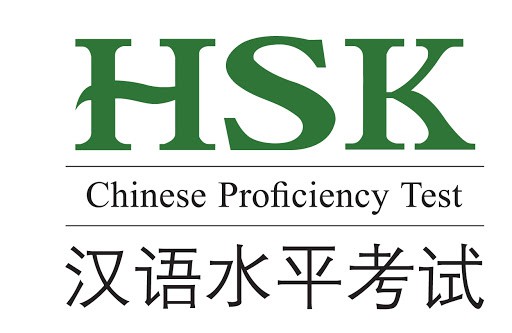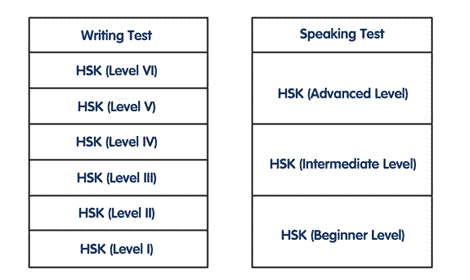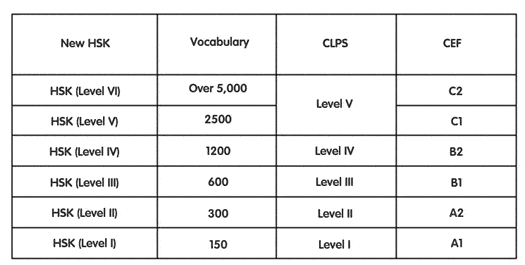HSK-Test, Official Chinese Proficiency Test
HSK (Hanyu Shuiping Kaoshi) or the Chinese Proficiency Test is an international standardized exam.

HSK-Test, Official Chinese Proficiency Test
HSK (Hanyu Shuiping Kaoshi) or the Chinese Proficiency Test is an international standardized exam which tests and rates Chinese language proficiency. It assesses non-native Chinese speakers’ abilities in using the Chinese language in their daily, academic and professional lives. HSK test was developed in 1984 and the first HSK test was held overseas in 1991.
Globea Education offers official HSK testing center. If you want to pass HSK with high score, we also offer HSK preparation classes.
Test Structure
The new HSK is an international standardized exam that tests and rates Chinese language proficiency. It assesses non-native Chinese speakers abilities in using the Chinese language in their daily, academic and professional lives. The new HSK consists of a writing test and a speaking test, which are independent of each other. There are six levels of writing tests, namely the HSK (level I), HSK (level II), HSK (level III), HSK (level IV), HSK (level V), and HSK (level VI). There are three levels of speaking tests, namely the HSK (beginner level), HSK (intermediate level), and HSK (advanced level). During the speaking test, test takers’ speeches will be recorded.

Test Levels
The different levels of the new HSK are similar to some of the levels in the Chinese Language Proficiency Scales for Speakers of Other Languages (CLPS) and the Common European Framework of Reference (CEF); details are as follows:

Level I: Test takers who are able to pass the HSK (Level I) can understand and use very simple Chinese phrases, meet basic needs for communication and possess the ability to further their Chinese language studies.
Level II: Test takers who are able to pass the HSK (Level II) have an excellent grasp of basic Chinese and can communicate in simple and routine tasks requiring a simple and direct exchange of information on familiar and routine matters.
Level III: Test takers who are able to pass the HSK (Level III) can communicate in Chinese at a basic level in their daily, academic and professional lives. They can manage most communication in Chinese when travelling in China.
Level IV: Test takers who are able to pass the HSK (Level IV) can converse in Chinese on a wide range of topics and are able to communicate fluently with native Chinese speakers.
Level V: Test takers who are able to pass the HSK (Level V) can read Chinese newspapers and magazines, enjoy Chinese films and plays, and give a full-length speech in Chinese.
Level VI: Test takers who are able to pass the HSK (Level VI) can easily comprehend written and spoken information in Chinese and can effectively express themselves in Chinese, both orally and on paper.
Test Principles
The HSK follows the principle of test-teaching correlation, bases the design of the test on the current trends in international Chinese language training, and is closely related to textbooks. The purpose of the test is to promote training through testing and promote learning through testing.
The HSK emphasizes the objectivity and accuracy of the evaluation and stresses the learners actual Chinese language abilities.
The HSK sets clear test objectives to allow the test takers to be able to improve their Chinese language abilities in a systematic and efficient way.
Testing Purposes
The HSK retains the former HSK orientation as a general (or universal) Chinese language abilities test. The results of the test can serve several purposes:
- reference for an educational institution decision-making concerning recruiting students, assigning students to different classes, allowing students to skip certain courses and giving students academic credits.
- reference for employers decision-making concerning the recruitment, training and promotion of test takers.
- method for Chinese language learners to assess and improve their proficiency in Chinese.
- method for Chinese language training institutions to evaluate training results.
Results Certificate
Globea Education test takers will receive the results for the HSK with clear information about the level reached.
Learning system
Our learning system is the most efficient way to learn Chinese.
With expert teachers, small classes, high levels of individual attention and engaging lessons, you can be confident that whatever you hope to achieve we can help you get there – fast



1. Before you start the course
Upon your arrival you will receive extensive diagnostic tests to identify your proficiency level, learning strengths and the areas in which we can help you improve, such as grammar, vocabulary, pronunciation, reading, writing, listening and speaking.

2. When you begin the course.
When you begin your course, your Chinese counselor will share your test results with you and talk to you about what you would like to achieve. Your teacher or tutor will create a personalized “learning plan” for you and decide on the best way for meeting your specific learning objectives.

3. During the course
Our expert teachers regularly monitor and assess your progress. You will receive regular consultations to discuss your development. Your teacher can advise you on the best study materials for you and how to practice your language skills outside the classroom, for example in your homestay family.

4. Progress reports
You will receive regular progress reports throughout the course and upon completion. These reports detail your proficiency, development and progress. You can use these documents as a record of your Chinese studies for schools, universities and employers.

5. When course is ending
Your language learning is never complete. Before you leave the course we will provide you with guidance about how to continue improving your language skills when you return home. We can also help you apply to Chinese universities for further study.

